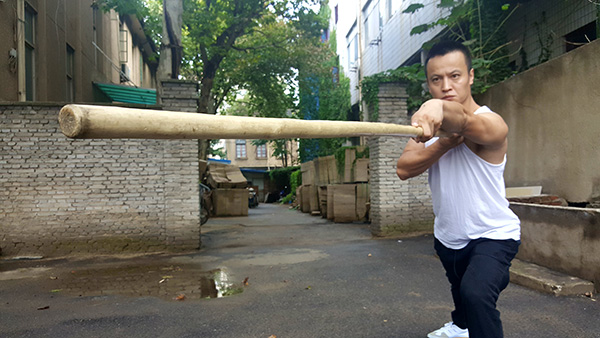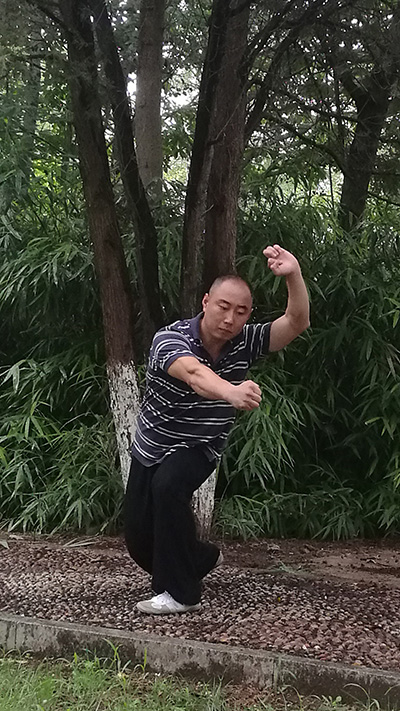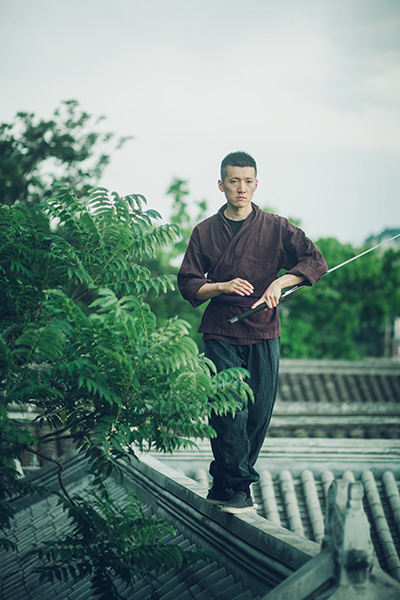 |
|
Traditional Chinese martial arts are adored by many Chinese fans, including hostel founder Daniel Huang from Taiwan. [Photo provided to China Daily] |
Every day from 9 am to 5 pm, Liu Yi is busy at work as a human resources specialist in a State-run company in the Chinese capital. The demands of his job, which includes preparing regular career assessments, is much like that of many white-collar workers in the country.
But out of the office, the 28-year-old leads a life that few of his colleagues know about-the Beijinger is a serious Chinese martial arts practitioner. He specializes in the Three-Emperor Cannon Fist technique.
"Nowadays, fewer young people love what they do. They seldom cherish things because they believe nothing truly belongs to them," says Liu.
"The Cannon Fist has become an integral part of my life."
Liu started training in traditional martial arts at age 5. He now spends at least two weeknights honing his skills. On weekends, he meets his 53-year-old master, Wang Qi, to learn new techniques at the Temple of Heaven.
 |
|
Beijing-based TV and movie production manager Zhang Zehao. [Photo provided to China Daily] |
Their fighting skills are based on three legendary Chinese emperors-Fuxi, Shennong and the Yellow Emperor. Liu has been practicing the Cannon Fist, which focuses on speed and bursts of power, for nearly two decades. He says he still has a lot to learn.
Many of his fellow disciples quit classes due to social commitments and the pressures of modern life, such as work and marriage, but Liu persevered. He spends his spare time collecting and organizing written and video materials related to traditional Chinese martial arts. He is widely expected to be Wang's successor.
Liu is aware that certain types of kung fu, especially the less-known styles, are in danger of becoming extinct amid China's rapid economic development and the social transitions of the past decades.
He considers himself one of the young people across the country who are not professional kung fu practitioners but who try to devote as much time as possible to preserve and hopefully pass on the intangible cultural heritage.
A video clip of mixed martial arts fighter Xu Xiaodong knocking down self-proclaimed tai chi master Wei Lei within seconds went viral in April. The incident sparked a huge discussion in China about the merits of its traditional martial arts.
The Chinese Martial Arts Association later responded to the incident, saying that such "arranged private fights" are a violation of the law as well as "the morals and values of martial arts".
Liu says: "Traditional Chinese martial arts are not just about fighting skills. In modern society, imparting and inheriting these arts and the values attached to them are much more important than using them to fight."
Liu Zhongyi, a financial director of a State-run company in Shandong.[Photo provided to China Daily]
Beyond battles

The value of martial arts lies in the philosophy, discipline and health aspects behind them, says Beijing-based TV and movie production manager Zhang Zehao.
Unlike many youth who enjoy modern forms of entertainment, such as computer games, Zhang spent most of his holidays during primary and secondary school learning kung fu.
"It was an important form of entertainment for boys of my age back in the northern countryside," the 38-year-old recalls.
Zhang later focused on tanglangquan (mantis fist), a fighting style inspired by the namesake insect's movements.
"Traditional Chinese martial arts are an irreplaceable part of our culture," says Zhang. "Fighting is only a part of it."
For example, in contrast with Western heroes, who save the world with science or supernatural abilities, Chinese prefer to entrust heroes with unparalleled kung fu and its admirable values so that they can overcome evil, he says.
Zhang himself tries to adhere to traditional Chinese martial arts' values, such as humility and respect for others, in his daily life.
"Kung fu is an accumulation of the time and thought invested in pushing one's limits," he says.
"You might not be invincible and beat all your competitors. But you benefit from the self-improvement that comes with the discipline of practicing it over the years."
 |
|
Traditional Chinese martial arts are adored by many Chinese fans, including hostel founder Daniel Huang from Taiwan. [Photo provided to China Daily] |
Critical learning
Compared with combat sports like MMA, which adopt scientific training approaches carried out within a specific, concise framework, traditional martial arts seem to have developed into a more complex and-some claim to a degree-redundant system.
"Traditional martial arts contain too many variations. That's what many practitioners were actually proud of," says Liu Zhongyi.
The 36-year-old is a descendant of masters who practiced the Seven-Star Praying Mantis, a well-known, traditional northern-style kung fu.
"But if you want these arts to be efficient, they need to be more concise," he says.
Liu Zhongyi is a financial director in a State-run company in Shandong province. He spends about 90 minutes every morning practicing traditional martial arts.
"It has been my long-term habit," he says. "I love kung fu from the bottom of my heart."
Liu Zhongyi says he began to realize that there were some gaps in kung fu after training for about two decades. The mantis fist encompasses several different styles. His kung fu master also modified the techniques he learned.
"Certain skills in the Seven-Star Praying Mantis are only useful in my own circle. They are not applicable to other traditional martial arts," he says.
Liu Zhongyi decided to search for more "universal kung fu skills" that could be applied to other traditional martial arts and even such fighting styles as MMA.
Liu Zhongyi hopes to find the original and most efficient skills within the mantis fist.
"I want to have a clear view of my system that will be easy to teach and learn," he says.
 |
|
Traditional Chinese martial arts are adored by many Chinese fans, including hostel founder Daniel Huang from Taiwan. [Photo provided to China Daily] |
New challenges
Many kung fu practitioners also worry about the obstacles in reviving traditional skills brought about by modern lifestyles and technology, with more people accessing martial arts information online at the expense of practical learning.
"We live in an era where knowledge far outweighs skills," says 36-year-old kung fu practitioner Daniel Huang from Taiwan.
"People know a lot about traditional Chinese martial arts, but that doesn't mean they can master it. There is a huge difference."
Huang grew up in Canada. His enthusiasm for traditional Chinese martial arts started in high school. Since his early 20s, Huang has been learning Chinese martial arts with Adam Hsu, a Taiwan master and educator specializing in traditional northern-style kung fu.
Hsu's kung fu possesses a distinctive beauty after years of practice, says Huang.
"If you describe it in terms of Chinese calligraphy, his strokes (or moves) would be very elaborate, rather than flamboyant."
In 2011, Huang established three hostels on the Chinese mainland to promote traditional Chinese martial arts. He regularly flies back to Taiwan to continue his training under Hsu.
"We want to find and preserve the origins of traditional Chinese martial arts," says Huang.
"It's like finding their stem cells, so that they can continue to evolve over time."

Presented by Chinadaily.com.cn Registration Number: 10023870-7
Copyright © Ministry of Culture, P.R.China. All rights reserved